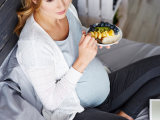Nausea in Pregnancy: Which Foods Relieve and Which Worsen the Discomfort?

It comes on without warning, often upon waking, sometimes in the middle of the day, and can turn a pregnant woman's routine into a real ordeal. Nausea in pregnancy affects more than half of pregnant women and, although it does not pose a risk to the baby in most cases, it can make every meal feel like a challenge. For some women, the mere smell of coffee or toast can be unbearable; for others, the feeling of queasiness comes and goes with no clear pattern, leaving them at the mercy of an unpredictable stomach.
The origin of this nausea is not fully defined, but science points to a combination of hormonal changes, increased human chorionic gonadotropin (hCG), elevated estrogen levels and increased sensitivity of the digestive tract. The problem is that, although it is a passing discomfort in most cases, its impact on eating is undeniable. There are days when eating becomes a matter of trial and error: what felt good yesterday is now turning in the stomach.
This is where food ceases to be just a source of nutrients and becomes a tool to cope with discomfort and mitigate symptoms. It's not a matter of taste, but of chemistry and physiology.
Diet plays a key role in managing these symptoms. Choosing the right foods and adopting certain dietary strategies can help mitigate nausea and improve well-being during pregnancy. So let's take a look at which foods can alleviate or worsen nausea.
Foods that help relieve nausea:
- Foods rich in complex carbohydrates: Foods such as toast, crackers and whole-grain cereals are easy to digest and can help stabilize blood sugar levels, reducing the feeling of nausea.
- Lean protein: Incorporating protein at breakfast, such as eggs, cottage cheese or yogurt, can help keep glucose levels stable and reduce nausea.
- Ginger: Ginger has been traditionally used to relieve nausea. Studies suggest that its consumption in the form of infusions, candies or as a spice in meals may be beneficial. However, this ingredient may have contraindications for pregnant women, so it is important that it is always used under the guidance of the obstetrician and in amounts considered safe.
- Fresh fruits: Some women find relief by consuming fruits such as apples or pears, which are easy to digest and provide hydration. It is advisable to combine them with a source of protein or healthy fats to keep blood sugar levels stable.
- Foods rich in vitamin B6: Vitamin B6 can help reduce nausea. Foods such as meats (especially poultry), fish such as salmon, bananas and nuts are good sources of this vitamin.
To learn more:
Foods and habits that can make nausea worse:
- Fatty or fried foods: These are slow to digest and can increase the feeling of heaviness and discomfort.
- Spicy foods: They can irritate the stomach and exacerbate nausea.
- Strong odors: Avoiding exposure to strong odors that may trigger nausea is recommended. Cooking with methods that minimize odors, such as boiling or steaming, may be helpful.
- Skipping meals: An empty stomach can intensify nausea. It is advisable to eat small amounts of food frequently to keep blood sugar levels stable.
- Drinking liquids during meals: Drinking large amounts of liquid with meals can increase the feeling of fullness and cause nausea. It is preferable to consume liquids between meals.
You are unique
It is important to remember that each woman is unique, and what works for one may not be effective for another. If nausea and vomiting are severe or persistent, it is essential to consult a health care professional for proper evaluation and treatment.
You may also be interested in:
 Patricia González
Patricia González


Comments